“I did it from right here — with this coin.”
Tumbling through time, Barnabas and Julia have come to a hard stop at 1995, lured by the siren call of alternative rock and Richard Linklater movies. No one has a mint-with-tag Beanie Baby or anything, but you can tell it’s 1995 because everybody keeps dying hard, with a vengeance.
The Collinwood of the future is in ruins, abandoned and left to rot after a particularly brutal cancellation twenty-five years ago. The main characters who aren’t dead are irretrievably insane, stumbling through a devastated ABC Studio 16, waiting for someone to turn on the cameras again. They don’t cancel soap operas like this anymore; they have a much more humane system, where actors who can’t be placed in foster soaps get their own web series.
Here in 1995, Carolyn Stoddard Hawkes, Dark Shadows’ signature twenty-something sweetheart, is now pushing fifty, and apparently she’s been pushing it with her face. She looks awful. She’s spent the last couple decades becoming that loneliest of creatures, a cat lady who doesn’t have cats.
But from our perspective, this is still the Carolyn Yet to Come, and if Barnabas and Julia can find out what caused all this daytime trauma, then maybe it’s avertable. Like A Christmas Carol, The Terminator and 12 Monkeys, the question of this story is whether the future can be changed if everybody stops acting like a jerk for five seconds.
Of course, this isn’t the only possible future for Carolyn. If we skip in time to the fall of 2013, there’s The Flip Side, the Big Finish audio play by Cody Quijano-Schell, that brings Nancy Barrett back in her original role. She’s paired with Christopher Ragland as Jonah, the nephew of the Blue Whale’s bartender, for an hour-long expose on whatever happened to Carolyn Stoddard. (If you haven’t heard The Flip Side, or any of the 50 original-cast Dark Shadows audiobooks, check out the end of this post for a special offer from Big Finish for Dark Shadows Every Day readers!)
Nancy Barrett first appeared in the Big Finish audios in 2009, but spent most of her time playing Charity Trask and Pansy Faye; it was in 2013 that Big Finish started to assemble a consistent “present day” of Collinwood, set somewhere around a decade after the show ended. Other characters have moved on or moved out — David and Amy are in college, Maggie’s been released from Windcliff and is now running the Collinsport Inn, Sabrina is struggling to cope after Chris’ death.
And Carolyn, in her early thirties, is basically nowhere at all. As the story opens, she’s getting drunk at the Blue Whale with her friends, and that is pretty much the beginning and the end of what Carolyn’s been up to.
Meanwhile, Jonah, who’s working for his uncle at the Blue Whale, has gone through some alarming changes. He murders himself, for one thing, just hits himself with a bottle, leaves his own corpse in the back room, and goes out front to serve drinks. This isn’t the real Jonah — or at least, not the one that usually works here.
This Jonah has a searing grudge and a magic coin, which gives him a handful of psychic powers, including the ability to make people angry at Carolyn. He whispers in their ears, fanning the flame of their insecurities. He plants the suggestion that Carolyn thinks of Maggie as an employee, that she treats Amy like the poor little orphan girl, that she doesn’t respect Sheriff Hardy after he let the previous sheriff die. And they all walk out on her, leaving her alone in the bar with this dangerous faux-Jonah.
Most of the story is an increasingly tense conversation between Carolyn and this mysterious villain, which moves gradually from small talk to a couple of flirtatious dares, and then a close examination of everything that’s wrong with her personality and her life.
The villains in these audio stories tend to be the sadistic serial-killer type, because there’s a lot of time to fill, and we can’t see what they’re doing. So mean Jonah can’t just walk up and clonk nice Jonah with the bottle; he has to talk to him first, showing off his magic coin and the terrible mess he’s made of their uncle. Big Finish villains like playing with their food.
So it’s a slow-drip torture session, really, where Jonah goes step by step through all of Carolyn’s character flaws, criticizing her intelligence, courage and life choices. He invokes various potential futures and parallel time bands, where Carolyn became a vampire, or a werewolf, or the queen of the Leviathans. You’d think that our Carolyn would come off well in that kind of comparison, but the way they discuss it, it’s like at least the Leviathan Queen has done something interesting with her life.
In 1995, the show is puzzling over a similar question, asking what would become of Carolyn if we took away her family and left her alone for twenty-five years. The answer seems to be that she’d waste away, neglecting her hair care regimen and curating a collection of souvenirs from a past that she only partially remembers.
Barnabas is desperate for Carolyn’s help — he needs to know what happened the night Collinwood was destroyed, and she’s the only survivor. But she doesn’t trust him after all these lonely years, and she doesn’t believe that she can help anyone.
Trying to break through, Barnabas points to a picture in her photo album.
“Who is this, in this picture?” he asks. She draws a blank. “It was taken a little less than twenty-five years ago. It’s a girl — a young woman. A woman with courage, and spirit, who cared more for her family than anything. Now do you remember?”
She shakes her head.
“Carolyn, it’s you,” he tells her. “It’s you.”
Meanwhile, in 2013, Jonah is not nearly as supportive. The Big Finish Carolyn doesn’t have a catastrophe to blame her failures on. She’s had all of the opportunities that money and freedom could give her, and she’s wasted them. She hasn’t made anything of herself; she’s just drifting through life. And along comes this angry Agrajag, who’s traveled across a dozen dimensions just to tell her what a loser she is.
“I finally worked it out,” he explains, after showing her a vision of a parallel Carolyn. “That Carolyn had bad points, like you; she was selfish, flighty, vain. But unlike you, she still had a husband, she worked in the antiques shop, she had friends who respected her. She still had something to live for.”
That’s harsh, obviously, but you can see where he’s coming from. If you look at 1970 Collinwood and imagine the future, you can easily see Maggie ending up where Big Finish suggests — making her own way, running a small business in town. The children are going to grow up and go to school, and choose a path in life. But we’ve seen Carolyn at age 24, with a high school degree, a dead husband and nothing in particular to do.
Although, to be fair, Quentin doesn’t have a job either, and the only thing he did between 1897 and 1970 was go to the Hi Hat Lounge and buy a watch.
These two stories are like the two sides of a coin. In 1995, Nancy Barrett is a young woman playing twenty-five years older. In 2013, she’s an old woman playing thirty years younger. This makes processing The Flip Side a little challenging.
All of the original cast members who star in Big Finish audios are in their seventies now, and you can hear the passage of time in their voices. This mostly works okay, because the actors are playing “older and wiser” versions of their characters. Kathryn Leigh Scott’s Maggie doesn’t sound like a woman in her mid-thirties, and David Selby’s Quentin doesn’t sound like an ageless young man with a portrait in the attic, but the characters are supposed to be more mature and reflective, and it’s fairly easy to accept the change.
But Nancy Barrett sounds like a sozzled old barfly, which cuts against the grain of the story; she’s playing Jo Grant with the voice of Iris Wildthyme. The story is all about Carolyn struggling to grow up, hitting her thirties and still dancing for guys at the Blue Whale. So the story’s working against her voice a bit, and you have to make a special effort to keep your disbelief appropriately suspended.
But the script is asking the right questions about Carolyn’s future, because the character as we know her on the show is primarily defined by her relationships with other people.
Carolyn has more love interests than anyone else on the show — Joe, Burke, Buzz, Tony, Adam, Chris and Jeb — and even more than that, if you count Jeb as four people. On Dark Shadows Wiki, the bulk of her article is a huge “relationships” section.
And yet Carolyn is mostly unchanged when these relationships end. Joe, Burke and Buzz were childish fancies. Tony, Adam and Chris were more substantial, but each of them disappeared from her life quietly, offscreen. Tony was never invited back to the house, Adam went upstairs to polish his skis, and she just casually decided that she wasn’t really interested in Chris anymore.
She did finally land on Jeb as a life-changing romance, but he was thrown off a cliff almost immediately, setting her back to square one. She doesn’t have a job or a hobby, or any interests outside the family, and she wastes the time she has left chasing after a Jeb-alike. As the series ends, she’s got no real direction — she’s stuck in 1970 forever, in a holding pattern.
But Barnabas believes in her, at least — a woman with courage, and spirit, who cared more for her family than anything. And his faith in her awakens that spirit, and she runs to the Old House to tell everyone that she hasn’t changed, not really, and she’s going to help fix history. She’s a fighter, a protector of her family, and she writes down the clues that Barnabas and Julia will need, in order to fight the creature that destroyed her life.
That’s the strength that Carolyn needs to fight Jonah, too, and the tension of The Flip Side is whether she can find that fierceness, or accept Jonah’s judgment that her life is going nowhere. The story is a meditation on who Carolyn really is, and the answer, when it comes, is both surprising and satisfying.
Tomorrow: Hold Me, Thrill Me, Kiss Me, Kill Me.
A SPECIAL OFFER FROM BIG FINISH!
Big Finish wants Dark Shadows Every Day readers to discover the world of audio Collinsport, so they’re taking 25% off the entire range of Dark Shadows audiobooks when you use the code DSED25OFF.
There are 50 Dark Shadows audiobooks, with performances by a variety of original cast members: Jonathan Frid, Nancy Barrett, David Selby, Lara Parker, Kathryn Leigh Scott, Jerry Lacy, John Karlen, Chris Pennock and a bunch more.
They cover a huge range of characters and time periods — Maggie’s time at Windcliff, Quentin’s travels after 1897, the continuing story of Charity Trask and Pansy Faye, an afterlife face-off between Angelique and Josette, and a whole series of Tony Peterson/Cassandra Collins murder mysteries.
My two favorites are both Quentin stories: London’s Burning, by Joe Lidster, pairs David Selby with Louise Jameson as Pansy Faye’s sister, and Roy Gill’s Panic introduces Quentin to Lela Quick, a fast-talking screwball-comedy heroine played by Susan Sullivan.
To get the discount, go to the Dark Shadows audiobooks range, add items to your basket, and enter the code DSED25OFF on the basket page. The offer is valid until Dec 31, 2017. I hope everybody enjoys it, and thanks to Big Finish for setting this up!
Dark Shadows bloopers to watch out for:
Barnabas tells Julia, “You’d better come into the drawing room with me. I don’t want to let you out here alone.”
In the photo album scene, Barnabas says “Carolyn, it’s you” three times. It sounds to me like he does the first one too early — it would make more sense for him to say it twice in the scene.
Barnabas notices a weird tone in Julia’s voice, and she explains, “We’re both very tired. We could say anything, you could hear anything.” Barnabas says, “Well, maybe,” and then looks at the teleprompter. “But in any case… we both… are tired.”
When Barnabas approaches Carolyn at the desk in the Collinwood drawing room, somebody’s shuffling around just off-camera. When he says, “I know how difficult it’s been for you,” a stagehand’s arm is in the shot.
Tomorrow: Hold Me, Thrill Me, Kiss Me, Kill Me.
— Danny Horn

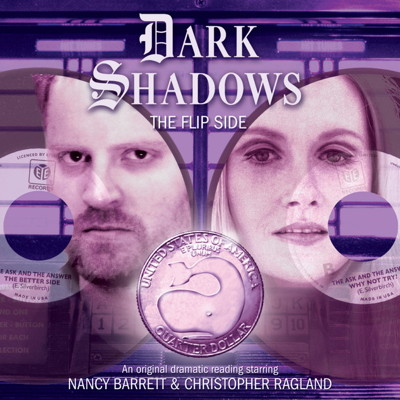

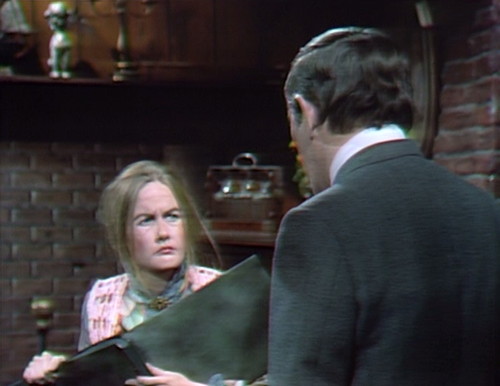

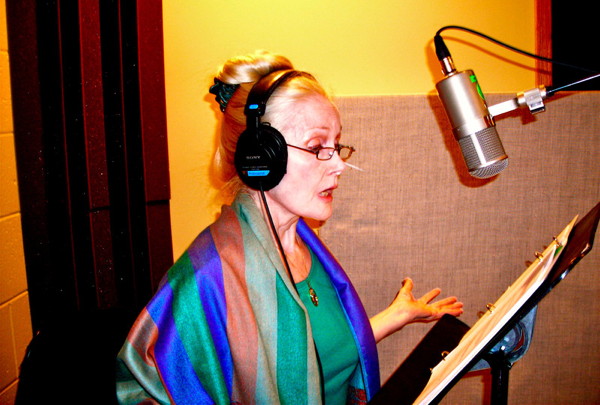
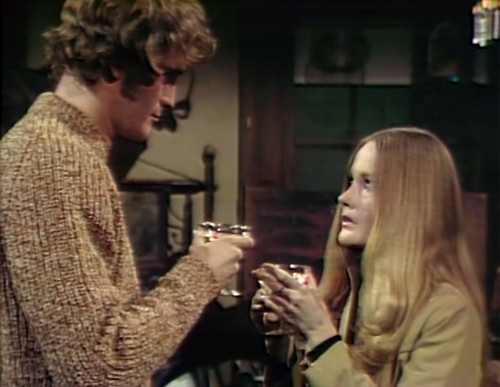
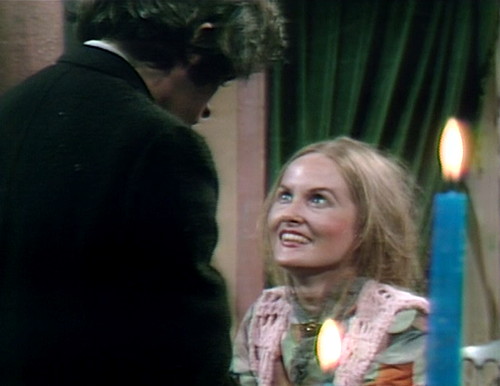
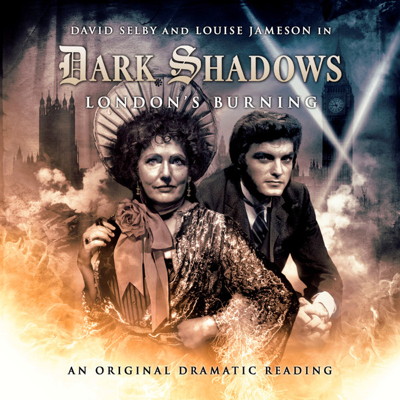
I’ve plugged the blog on the Divergent Universe forum. There’s loads of chat about all things Big Finish including their Dark Shadows stories.
I haven’t heard any of the Big Finish stuff but I have had experiences seeing actors and actresses onstage who were way older than their characters and it’s excruciating. There’s only so much disbelief one can suspend. And in this case, the sound would be too much at odds with the premise and theme of the drama.
But. But. I could be persuaded to buy a Big Finish if… if… wait for it. Rodan is still around, Barrett lives. Adam strides confidently into the Collinsport convalescent home, having spent decades as a successful but reclusive hedge fund manager. He wants to hash out the past and Carolyn is the last one left alive he can still yell at. I think it would be gripping stuff.
Lara Parker still sounds exactly as she did on the show, same with John Karlen.
Robert Rodan was in a story in the first full cast season, The Rage Beneath, as the captain of a ghost ship. Of course he had a bone to pick with the Collins family.
Where can I find the James Storm DS gossip that you mentioned?
And, wasn’t he in a rock band?
Here’s a thread I just found that has what appear to be some knowledgeable people (and some who aren’t). DANNY: PLEASE FEEL FREE TO REMOVE THIS if you do not want to encourage this kind of talk. Sometimes I think I’ve lowered the discourse here and do’t talk enough about furnishings. (PS: I have done elaborate searches for the Ralston Purina lamp and have found some similar styles–but the real thing is elusive.)
https://www.datalounge.com/thread/11378741-who-was-gay-in-the-original-dark-shadows-tv-series-
That site/thread is just hilarious — I happened on it a couple years back while searching for something else. Just pure, salacious gossip and in many cases wishful thinking, but entertaining nonetheless.
To me, the most interesting tidbit is the one about Nancy Barrett — but since that one post in that one thread is the only known source online or otherwise, I wouldn’t consider it reliable.
There really isn’t all that much “data” in that “lounge”. 🙂
Yeah, that one threw me, too. She married and divorced two much older men and then I believe had a long, successful marriage to another one, a doctor. The idea that this would go hand in hand with being a predatory lesbian is quite something. But it’s fun to think about!
Yes, that, and the difficulty of trying to imagine WHO she slept with, or in other words, who agreed to sleep with her. After some brief thought, you quickly realise the impossibility of the whole thing.
it’s a very funny thread though.
That was my instinct, too. Found that posting about the time I found DSED – and didn’t go back to read anything more.
I’m quite pleased with my decision. 🙂 🙂
“…Adam went upstairs to polish his skis…”
He must have bumped into Bobby Martin.
I always assumed Carolyn would take over the business, like she did when Laura put Elizabeth into a catatonic state and left instructions that Carolyn should be in charge instead of Roger. Granted, Roger slowly took over a lot of responsibility since then, but she did so well at it in 1967 that I can’t imagine her not diving back in as her uncle gets closer to retirement age. If they left the business for David to run, he’d end up doing something like taking on a ghost as a partner or investing in banshee futures.
Or use a crystal ball to predict market volativity.
The main reason Roger did not have as much of a share in running the family business as he’d liked was his lack of responsibility — the hallmark of Roger’s true nature. But then they had to make Roger a bit nicer to keep him on the show.
I was just thinking about what a burden it must have been growing up as David Collins, the last of the family line and therefore the one responsible for carrying on the Collins name. I wonder if Big Finish ever addressed this.
In Return to Collinwood (the cast reunion audio drama before the Big Finish audio dramas on Dark Shadows started, written by Jamison Selby), David is “offscreen” on some research expedition in Peru, but is married — his wife Violet is sent in his place to attend a family gathering for the reading of Elizabeth’s will. There is no mention of whether David and Violet have children. Violet’s maiden name is Chavez and is played by Terry Crawford. Quentin has suspicions about her true identity. Months later, the family still has received no word from David.
With all the screwing around that Quentin was famous for, there is quite possibly another male Collins out there to carry on the family name.
For important David stories, listen to Kingdom of the Dead, Bloodlust and Tainted Love.
David doesn’t know that Barnabas and Quentin are genealogical dead ends. I mean, I guess technically Quentin could have more legitimate issue, but I doubt he’d risk passing on the curse again. And I guess Barnabas could become human again, but I’m not keeping my fingers crossed.
Quentin needs to get over the fears that his son would suffer from the werewolf curse. All he has to do is to provide a safe holding cell where his son could go through the transformation and be safely kept away from others. The secret room in the mausoleum worked great in such matters. If you can’t cure lycanthropy, you manage it.
Managing Lycanthropy – Or What To Do When You’re A Werewolf
By Quentin Collins (foreword by Lawrence Talbot) – Lobo Publishing, 1970 (currently out of print)
It replaced the less popular Who, What, When, Why, Werewolf by Grant Douglas, with illustrations by Charles Delaware Tate.
I liked Carolyn SO much better when she was running the house! She had something to do! Something to focus on! I get why she was so damn bored she was ready to work in that “even without the Leviathans this business model blows chunks” antique shop for apparently no pay–she needed a reason to not just hang around the house all day, every day.
Mad Carolyn may have been driven to insanity by the mystery catastrophe, but she was ready to go anyway–driven batty by boredom, looney by leisure. And of course she ended up there anyway; in a mini-version of her home, with scraps and tatters of the house around her, and planning endless picnics that will never come.
There are quite a few moments in this 1995 storyline that still stick with me. One is this episode’s Barnabas-Carolyn photo album exchange. Jonathan Frid shows the “kind soul” persona several times here.. He also resumes caring about his modern family, long dead in 1995 but only a few months gone to him and Julia.
“Carolyn, it’s you” always makes me think of Captain Picard’s, “Oh, it’s me!” in the Star Trek: The Next Generation episode “The Inner Light.”
Good call. That was a haunting moment in a devastating episode (The Inner Light, I mean). Stewart’s hoarseness is what made it.
It was the “Barnabas never hurt me” line that stuck with me. I thought “Yep, she’s crazy!”
The photo album scene is quite simply the most beautifully written and acted scene in the entire series. In a more just world, Dark Shadows wouldn’t be remembered as “the vampire soap opera,” but as “the show where Nancy Barrett got her start.”
Hah, Lela Quick, Like Lela Swift, the director.
There are a couple of scenes in today’s episode (including one above with Quentin) where Carolyn is smiling in such a way as to appear completely unhinged. Every time I think I’ve seen everything Nancy Barrett can give, she gives something more.
How does a vampire get tired?
Low blood sugar?
It was Big Finish that first got me into Dark Shadows. They released the first full-cast audio as a freebie and it hit me like a gateway drug!
I haven’t heard every audio as I made the decision to listen along with watching the series. So I’ve heard all the Quentin stories and all the other 1795 & 1897 related stories and any other that was set during the first 1000 TV eps.
I know there’s some 1840 related audios coming up in my list that I’m looking forward to hearing (especially the one with Arthur Darvill as the grown up Tad).
Is there going to be an explanation for Barnabas flipping through Volume One for a few seconds, having it fly from his hands, & finding Volume Two with the pages torn out & believing this was the book he was holding & knowing the early 19th Century was missing from the beginning even though he flipped through the end?
The family history book flying out of Barnabas’ hands is one of the better effects in some time.